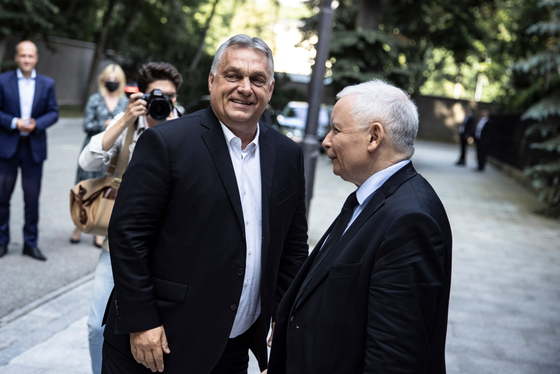By UME
The leaders of sixteen political parties in the European Union, including Fidesz and Poland’s Law and Justice (PiS), issued a joint statement on Friday in which they support the EU’s ideals but oppose a European superstate. Read the full text here:
“The debate on the future of Europe that has just begun must not exclude the voices of the parties that represent citizens who are committed to European traditions and who work for the freedom of nations and the traditions of the European peoples.
The eventful history of Europe was marked by many accidents, especially in the last century.
In the face of aggressor states, peoples and states have had to experience unimaginable suffering in order to defend their sovereignty and territorial integrity. After World War II, some European countries struggled with totalitarian oppression by the Soviet Union for decades before regaining their independence.
This independence, the Atlantic alliance of the EU and NATO, and the peace between the cooperating nations is a great achievement for many Europeans, which offers a lasting feeling of security and ideal conditions for development. The integration process has made a major contribution to creating timeless structures for cooperation, maintaining peace and developing understanding and good relations between states. This work should be continued as it is a milestone.
However, the series of severe crises over the past decade has shaken and stalled European cooperation, mainly because nations feel that they are slowly being deprived of their sovereign rights.
The European Union needs a fundamental overhaul, because instead of defending Europe and its heritage, instead of guaranteeing the free development of the peoples of Europe, it has now become a source of problems, fears, and uncertainty.
The EU is increasingly becoming an instrument of extremist forces who want to reshape Europe culturally and religiously and ultimately want to build a Europe without nations. Its aim is to create a European superstate, to destroy or abolish European traditions, to change basic social institutions and moral principles.
There is legitimate opposition to the use of political structures and laws to create a European superstate and a new social order. This is a sign of the dangerous and violent social engineering that we have seen in the past. The moral excesses of the EU institutions have in recent years led to a dangerous tendency towards the imposition of an ideological monopoly.
We are convinced that the basis for cooperation between European nations is tradition, respect for the history and culture of European states, respect for the Judeo-Christian heritage of Europe and the common values that unite our nations, and not their destruction. We reaffirm our belief that the family is the fundamental unit of our nations. At a time when Europe is facing a serious demographic crisis with a low birth rate and an aging society, family-friendly policies must be the answer, not mass migration.
We believe that sovereignty in Europe is exercised by the nations of Europe, now and in the future. These nations created the European Union so that, through the Union, they could act more effectively to achieve certain goals than individual member states could. However, the EU’s powers are defined by the principle of devolution: all powers that are not transferred to the Union belong to the Member States, respecting the principle of subsidiarity.
Over the past few decades, the institutions of the European Union have repeatedly reinterpreted the European treaties, with the result that the limits of these competencies have shifted to considerable disadvantages for the member states. This is incompatible with the fundamental values of the Union and weakens the trust of European nations and their citizens in the EU institutions. In order to stop and reverse this process, the existing principle of deconcentration must be supplemented by the creation of a catalog of inviolable competencies of the EU member states and the establishment of a suitable mechanism to protect national competencies through the intervention of national constitutional courts or equivalent institutions. Every attempt Subordinating the national constitutional organs to the European organs creates chaos, undermines the intentions of the Treaties, calls into question the central role of the member states’ constitutions, while the resulting disputes over jurisdiction are in fact decided by the brutal enforcement of the will of the politically stronger entities. This destroys the foundations for the functioning of Europe as a community of free nations.
We believe that consensus must remain the way to achieve a common position in the Union. Recent attempts to circumvent this procedure or abolish the institution of consensus threaten to exclude certain countries from the decision-making process, thus turning the Union into a special oligarchy. This would lead to a de facto blockade of the national constitutional organs, such as governments and national parliaments, and thus limit national decision-making to the approval of decisions already made by others.
The will to work together is still overwhelming in the member states, and a spirit of community and friendship pervades the nations and societies of our continent. This is our true source of strength. A reformed Union can draw on this resource, while a Union that rejects reforms would only squander them.
We, therefore, appeal to all parties and political groupings that share our views – let this document be the basis for joint cultural and political work, taking into account the role of the current political groupings.
Let us renew the Union together for the future of Europe. ”
Source: Magyar Nemzet

